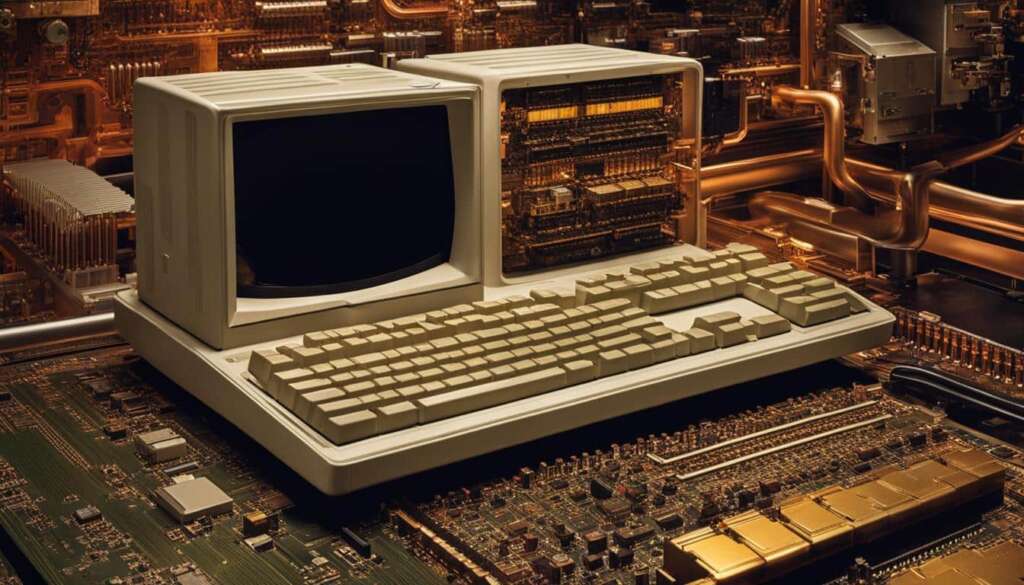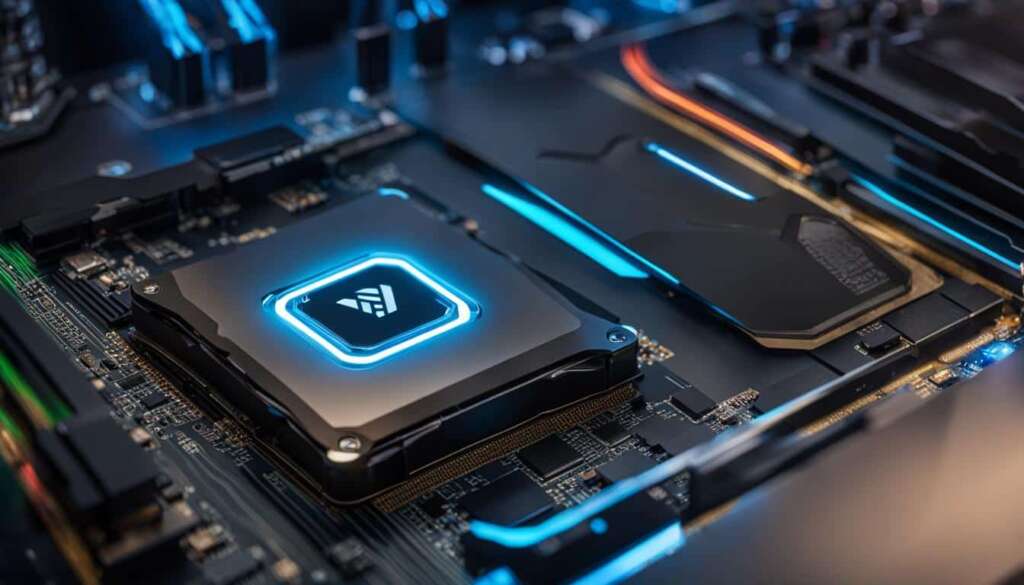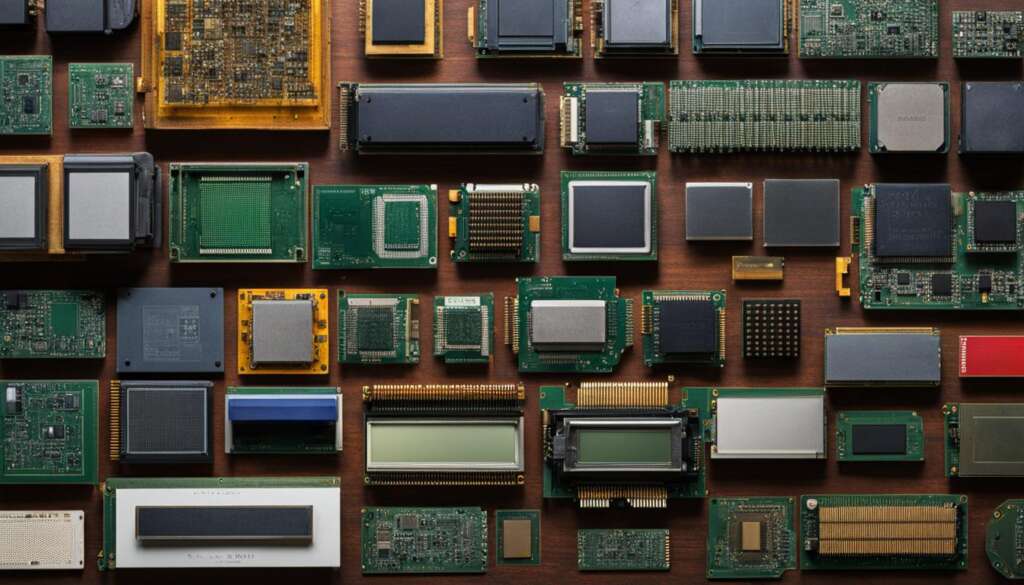Table of Contents
Gaming has had a significant impact on the development of processors, driving technological advancements and shaping the future of computing. The demand for more immersive and realistic gaming experiences has pushed hardware manufacturers to innovate and create more powerful and efficient processors.
From the early days of gaming to the present, processors have evolved to meet the growing needs of gamers. The gaming industry’s quest for cutting-edge technology has led to the development of powerful gaming CPUs that can handle complex graphics and deliver smooth gameplay.
Processors have become faster, more efficient, and capable of handling the demanding requirements of modern games. The advancements in processor development have not only benefited gaming but have also influenced other industries that rely on computing power.
As the gaming industry continues to evolve, the demand for even more powerful processors will drive further innovations in processor development. Gaming will continue to play a vital role in shaping the future of technology.
Gaming’s Impact on Technological Advancements
The gaming industry has been a driving force behind significant technological advancements, leading to innovations in computer graphics, processor capabilities, and storage capacities. The demand for more realistic and immersive gaming experiences has pushed hardware manufacturers to develop more powerful consoles, PCs, and mobile devices. As a result, gamers can now enjoy rich and visually stunning gameplay.
One area that has seen tremendous progress is computer graphics. Gaming’s need for high-resolution visuals and lifelike animations has fueled the development of advanced graphics processing units (GPUs). These powerful GPUs can now render complex scenes with realistic lighting and physics, creating breathtaking visuals that enhance the gaming experience.
Furthermore, gaming’s demand for faster and more efficient processors has led to significant advancements in processor capabilities. The complex algorithms and artificial intelligence systems developed for video games have found applications in various fields, from healthcare to data analysis. Gaming’s push for better performance has also driven processor manufacturers to optimize their designs, resulting in faster processing speeds and smoother gameplay.
The Evolution of Computer Graphics
Over the years, gaming has played a crucial role in pushing the boundaries of computer graphics. As game developers sought to create more immersive and visually stunning worlds, they required increasingly powerful hardware to support their vision. This demand led to constant innovation in graphics processing technology, resulting in more realistic and detailed graphics.
| Generation | Description |
|---|---|
| 1st Generation (1970s) | Simple 2D graphics with limited colors and resolution. Games like Pong and Space Invaders were popular. |
| 2nd Generation (1980s) | Introduction of 8-bit consoles and home computers. Graphics improved with more colors and higher resolutions. |
| 3rd Generation (1990s) | 16-bit consoles and personal computers brought more detailed and lifelike graphics. 3D graphics became more common. |
| 4th Generation (2000s) | Introduction of dedicated graphics cards and advanced rendering techniques. Games became more visually impressive with realistic lighting and textures. |
| 5th Generation (2010s) | The rise of high-definition gaming and the introduction of advanced GPUs. Graphics reached new levels of realism with improved physics and animations. |
In addition to graphics, gaming has also pushed the boundaries of storage capacities. The increasing size and complexity of modern games have driven the development of larger and faster storage solutions. From hard disk drives (HDDs) to solid-state drives (SSDs) and even cloud-based storage, gamers can now store and access large game libraries quickly and seamlessly.
Overall, gaming’s demand for realistic graphics, faster processors, and larger storage capacities has spurred significant technological advancements. These developments not only benefit the gaming industry but also have far-reaching implications for other fields such as entertainment, education, and simulation. As technology continues to evolve, gaming will undoubtedly continue to drive innovation and shape the future of technology.
Cultural Impact of Video Games
Video games have had a profound influence on popular culture, shaping the way we consume entertainment and interact with media. Iconic video game characters like Mario and Lara Croft have become household names, transcending the gaming world to become cultural icons. These characters have inspired fan art, cosplay, and even movies, contributing to the vibrant and diverse landscape of popular culture.
“Video games are the epitome of pop culture.” – Shigeru Miyamoto
One of the significant cultural impacts of video games is the rise of esports. Competitive gaming has evolved into a globally recognized and lucrative industry, attracting millions of viewers and offering substantial prize pools. Esports events, such as the League of Legends World Championship, rival traditional sporting events in terms of viewership and fan fervor. This phenomenon demonstrates the power of video games to bring people together, fostering a sense of community and shared passion.
Video games have also tackled complex social issues, providing a platform for storytelling and reflection. Games like “The Last of Us” and “Life is Strange” explore themes of loss, love, and humanity, prompting players to confront moral dilemmas and empathize with characters’ journeys. In addition, video games have increased representation and inclusivity, featuring diverse protagonists and addressing issues of race, gender, and sexuality. This has helped create a more inclusive and empathetic gaming community.
| Impact | Examples |
|---|---|
| Increased diversity and representation | Games like “The Witcher 3” and “Mass Effect” feature diverse characters and storylines that challenge traditional stereotypes. |
| Exploration of social issues | Games like “Detroit: Become Human” and “Gone Home” tackle topics such as discrimination, LGBTQ+ rights, and mental health. |
| Community development | Online gaming communities build connections and friendships, fostering a sense of belonging among players. |
As video games continue to evolve and push the boundaries of storytelling and technology, their cultural impact will only grow. With advancements in virtual reality, augmented reality, and interactive storytelling, the future of gaming holds endless possibilities for cultural exploration and innovation.
Social Connection and Community Building Through Gaming
Gaming has evolved from a solitary activity into a social experience, thanks to the rise of online multiplayer games. These games have provided a platform for people from different backgrounds to connect and interact with each other in virtual worlds. Players can join forces, form alliances, and embark on thrilling adventures together, fostering a sense of community and camaraderie. Whether it’s battling monsters, solving puzzles, or engaging in competitive matches, online multiplayer games have become a hub for social interaction and connection.
The gaming community has grown exponentially, with players forming friendships and even romantic relationships through their shared love for gaming. In virtual environments, players can communicate through chat functions, voice chat, and video calls, allowing them to bond and establish meaningful connections. These connections extend beyond the game itself, as players often participate in forums, social media groups, and conventions dedicated to their favorite games. Gaming has become a platform where people can find like-minded individuals, build relationships, and create lasting memories together.
Furthermore, the impact of gaming on social connection goes beyond personal relationships. Charitable initiatives within the gaming community have made a significant impact, raising millions of dollars for various charitable causes. Gamers have come together to support charitable organizations, such as Extra Life, which raises funds for children’s hospitals, and Games Done Quick, which hosts speedrunning marathons to raise money for various charities. These initiatives not only highlight the generosity of gamers but also demonstrate the power of gaming to unite people for a common cause.
“Gaming has evolved from a solitary activity into a social experience, thanks to the rise of online multiplayer games.”
The Power of Gaming Communities
Gaming communities have become an integral part of the gaming experience, providing players with a sense of belonging and support. These communities often have dedicated forums, Discord channels, and social media groups where players can discuss game strategies, share tips and tricks, and organize events. They foster a collaborative environment where players can learn from each other, improve their skills, and form partnerships for various in-game activities.
Moreover, gaming communities have shown their resilience and adaptability, especially during challenging times such as the COVID-19 pandemic. With physical gatherings limited, gaming communities have shifted to online platforms to maintain their social connections. Virtual events, tournaments, and live streams have become the norm, allowing players to stay connected and engaged with their communities. The ability of gaming communities to adapt and thrive in the face of adversity further highlights the social significance of gaming.
| Gaming Community Benefits | |
|---|---|
| 1. Social Interaction and Connection | Online multiplayer games provide a platform for people to connect, form friendships, and build relationships. |
| 2. Collaboration and Teamwork | Gaming communities foster teamwork and cooperation, as players work together to achieve common goals. |
| 3. Support and Empathy | Gaming communities offer support and understanding, creating a safe space for players to share experiences and seek advice. |
| 4. Skill Development | Gaming communities provide opportunities for players to learn from each other and improve their skills through shared knowledge and friendly competition. |
Educational Potential of Video Games
Video games have proven to possess significant educational potential, offering interactive and engaging experiences that promote problem-solving, critical thinking, and strategic planning. These games provide players with the opportunity to develop and improve cognitive and analytical skills while immersing themselves in virtual simulations.
One key aspect of video games is their ability to present complex challenges that require players to think critically and find innovative solutions. Whether it’s solving puzzles in adventure games or strategizing in real-time strategy games, players are constantly engaged in problem-solving activities that stimulate their minds and enhance their ability to analyze and make decisions.
Video games provide an interactive and dynamic learning environment that encourages players to think creatively and adapt to different situations. The problem-solving skills gained from gaming can be transferred to real-life scenarios, equipping players with valuable skills for future success.
Furthermore, video games often incorporate virtual simulations that allow players to experience real-world scenarios and learn through interactive experiences. For example, flight simulators provide aspiring pilots with a realistic training environment, while medical simulations offer medical professionals the opportunity to practice complex procedures without the risk associated with real patients. These virtual simulations not only enhance learning but also provide a safe and controlled space for practitioners and trainees to hone their skills.
| Skills Developed through Video Games | Examples |
|---|---|
| Problem-solving | Adventure games, puzzle games |
| Critical thinking | Strategy games, role-playing games |
| Strategic planning | Real-time strategy games, city-building games |
| Virtual simulations | Flight simulators, medical simulations |
By harnessing the educational potential of video games, educators have embraced the use of gaming as a tool for learning. Educational games, specifically designed with learning objectives in mind, have been integrated into school curricula to engage students and facilitate their understanding of complex concepts. These games offer an interactive and fun learning experience that motivates students to actively participate and apply their knowledge in a practical context.
In summary, video games have demonstrated their ability to foster problem-solving, critical thinking, and strategic planning skills. Through virtual simulations and interactive gameplay, players can gain valuable knowledge and experience in a safe and controlled environment. As educational tools, video games offer a unique and engaging way to promote learning and development among students of all ages.
The Early Years of Gaming
Gaming has a long and rich history, dating back to ancient times when board games were played in various cultures. These early games provided entertainment and served as a means of social interaction. They were often designed to test strategic thinking, problem-solving skills, and luck. Examples of popular board games throughout history include Chess, Backgammon, and Go.
The first recognized example of a game machine was unveiled in 1940. The “Nimatron” was a computerized device that allowed players to play a game of Nim, a mathematical strategy game. The Nimatron was created by Edward Condon and built by his team at the University of Pennsylvania. It was an early example of the potential of electronic devices for gaming.
| Year | Development |
|---|---|
| 1940 | Unveiling of the “Nimatron” game machine |
| 1967 | First game system designed for commercial home use |
The first game system designed for commercial home use emerged in 1967 with the release of the “Brown Box,” later renamed the Magnavox Odyssey. It was a console that connected to a television and allowed users to play games such as ping-pong, tennis, and shooting games. This marked an important milestone in the development of gaming technology, as it brought gaming into people’s homes and laid the foundation for the future of home gaming consoles.
Onward to Atari and Arcade Gaming
The introduction of Atari into the gaming industry marked a significant milestone in the development of arcade gaming. Atari, founded in 1972 by Nolan Bushnell and Ted Dabney, became known for its innovative and popular arcade games that captivated players around the world. One of its most iconic games, Pong, released in 1972, was the first commercially successful video game and is considered the catalyst for the arcade gaming boom.
Arcade gaming became a cultural phenomenon during the 1970s and 1980s, as people flocked to arcades to play the latest games and compete for high scores. The success of games like Pac-Man, Space Invaders, and Donkey Kong solidified the presence of arcades in popular culture, captivating both young and old audiences.
Another pivotal development in gaming during this era was the introduction of multiplayer gaming experiences. With the release of home computers and consoles, players could now compete against each other on separate screens. This allowed for new levels of excitement and interaction, fostering a sense of competition and camaraderie among gamers.

The Evolution of Multiplayer Gaming
The concept of multiplayer gaming was revolutionized by Atari with the release of its game Tank in 1974. The game allowed two players to compete against each other, signaling the beginning of a new era in gaming. Atari continued to innovate in the multiplayer space with games like Warlords and Football, which further expanded the possibilities for social gaming experiences.
As technology advanced, so did multiplayer gaming. The advent of local area networks (LANs) in the 1980s enabled players to connect their computers together for multiplayer gaming sessions. This paved the way for the development of popular LAN games like Doom and Quake, which became cultural phenomena and laid the foundation for the future of online multiplayer gaming.
Arcade Gaming Today
Although arcade gaming has evolved over the years, it remains a beloved part of gaming culture. Modern arcades offer a mix of classic arcade games and new experiences that cater to a nostalgic audience as well as younger players. The rise of retro arcades and barcades has brought arcade gaming back into the spotlight, providing a unique social setting where friends can gather, enjoy a drink, and relive the excitement of classic games.
| Atari Arcade Games | Release Year |
|---|---|
| Pong | 1972 |
| Pac-Man | 1980 |
| Space Invaders | 1978 |
| Donkey Kong | 1981 |
Home Gaming Becomes a Reality
The introduction of home gaming consoles and personal computers in the 1970s and 1980s revolutionized the gaming industry, making gaming more accessible to the general public. With the release of consoles like the Atari VCS and the rise of personal computers, gaming shifted from the arcades to people’s homes, creating a new era of gaming experiences.
The Atari VCS, released in 1977, was one of the first successful home gaming consoles. It allowed players to enjoy a variety of games in the comfort of their own homes. The popularity of the Atari VCS demonstrated the demand for home gaming and paved the way for future consoles and advancements in game technology.
During this time, hobbyist magazines dedicated to gaming emerged, providing enthusiasts with news, reviews, and tips for improving their gaming experience. These magazines, such as “Computer and Video Games” and “Electronic Games,” fostered a sense of community among gamers and contributed to the growth of the gaming industry.
| Year | Event |
|---|---|
| 1972 | Atari releases the classic game Pong, sparking widespread interest in video games. |
| 1977 | Atari VCS (Video Computer System), later known as the Atari 2600, is released, becoming a popular home gaming console. |
| 1980 | Pac-Man is released as an arcade game and later becomes a hit on home gaming platforms. |
| 1985 | Nintendo releases the Nintendo Entertainment System (NES), revitalizing the home gaming industry after the video game crash of 1983. |
The introduction of home gaming consoles and personal computers not only brought gaming into people’s living rooms but also laid the foundation for the development of the gaming community. Through multiplayer capabilities and gaming gatherings, players could connect and compete with friends and strangers alike, fostering a sense of camaraderie and competition.
How Mobiles and Apps Changed the Face of Gaming
The rise of mobile technology has revolutionized the gaming market, bringing entertainment right into the palms of our hands. With the proliferation of gaming apps, mobiles have become the go-to devices for gaming on the go. This shift has had a profound impact on the entertainment business, transforming the way people engage with games and challenging traditional gaming establishments.
Mobile gaming has quickly become the most lucrative segment of the gaming industry, allowing developers to reach a broader audience and generate billions of dollars in revenue. The accessibility and convenience of mobile gaming have attracted people from all walks of life, from casual gamers to dedicated enthusiasts. Whether it’s a quick match-three puzzle game or an immersive multiplayer experience, mobiles have made gaming more accessible than ever before.
This shift towards mobile gaming has presented challenges for traditional arcades and leisure establishments. These businesses have had to adapt to changing consumer preferences and incorporate new strategies to stay relevant. One such strategy is the integration of entertainment tablet kiosks, providing customers with a unique and engaging gaming experience. These tablet kiosks allow businesses to attract tech-savvy customers, increase footfall, and enhance customer retention.

The Impact of Mobiles and Apps on the Entertainment Business
The introduction of mobiles and apps has transformed the entertainment business, blurring the lines between traditional gaming and other forms of entertainment. With gaming apps readily available on smartphones and tablets, people can now play games while waiting in line, commuting, or relaxing at home. This ease of access has created new opportunities for businesses to engage with their customers and provide an immersive and interactive experience.
| Benefit | Effect |
|---|---|
| Increased Revenue | The mobile gaming market has become a significant source of revenue for businesses, attracting millions of players who are willing to spend on in-app purchases or premium subscriptions. |
| Enhanced Customer Engagement | Mobile gaming apps allow businesses to connect with their customers on a more personal level, offering tailored experiences, loyalty programs, and exclusive content. |
| Competitive Advantage | Businesses that embrace mobile gaming can gain a competitive edge by offering innovative and interactive experiences, attracting customers who are looking for new and exciting forms of entertainment. |
Mobile gaming has changed the way people interact with games and entertainment. It has opened up new possibilities for businesses to engage with their customers, increase revenue, and stay ahead in a highly competitive industry. With the continued advancements in mobile technology, the future of gaming looks promising, with endless opportunities for innovation and growth.
Gaming and the Entertainment Business
Gaming has not only revolutionized the gaming industry but has also made a significant impact on the entertainment business as a whole. One of the emerging trends in the industry is the use of tablet kiosks in restaurants and various establishments to attract tech-savvy customers. These tablet kiosks provide a cost-effective and secure way to bring mobile gaming into establishments, offering customers a unique and engaging entertainment experience.
One example of this trend is seen in McDonald’s, where tablet kiosks have been incorporated into their restaurants. With these kiosks, customers can enjoy playing games while waiting for their food or during their meal, enhancing their overall dining experience. This approach not only attracts more footfall but also increases customer retention, as individuals are more likely to spend more time in the establishment.
By integrating gaming into the entertainment business, establishments can create a more immersive environment that appeals to a wider audience. Tablet kiosks provide an interactive and engaging way for customers to entertain themselves, making the overall experience more enjoyable. This integration of gaming and the entertainment business showcases the growing influence of gaming in various industries and highlights the importance of catering to the preferences of tech-savvy customers.
| Benefits of Tablet Kiosks in the Entertainment Business | Examples in the Industry |
|---|---|
| Enhanced customer experience | McDonald’s tablet kiosks |
| Increased customer engagement and retention | Various hotels and restaurants |
| Cost-effective solution for entertainment | Amusement parks and arcades |
Overall, the integration of gaming into the entertainment business through tablet kiosks offers a win-win situation for both establishments and customers. It provides a unique form of entertainment that keeps customers engaged and satisfied, while also attracting more footfall and increasing customer retention. As the gaming industry continues to evolve and shape our world, it is essential for businesses to embrace these technological advancements and adapt to the changing preferences of their target audience.
Conclusion
Gaming has undoubtedly had a profound influence on the development of processors and the advancement of technology. The demand for more powerful and efficient designs, driven by the gaming industry, has pushed hardware manufacturers to innovate and create cutting-edge processors. This influence extends beyond processors, with gaming also contributing to advancements in graphics, virtual reality, and artificial intelligence.
As technology continues to evolve, the future of gaming looks promising. With ongoing developments in processors, we can expect even more realistic and immersive gaming experiences. The integration of virtual reality and augmented reality into gaming will further enhance the level of immersion and interactivity. Additionally, the influence of gaming on artificial intelligence will continue to shape the development of intelligent NPCs and adaptive gameplay.
Gaming’s impact on technology goes beyond entertainment. The educational potential of video games has been recognized, with games being used as tools for problem-solving, critical thinking, and skill development. As gaming continues to evolve, we can expect to see further integration of educational elements, allowing players to learn while they play.
Overall, the influence of gaming on technology is undeniable. As the gaming industry continues to grow and evolve, it will undoubtedly shape the future of technology in ways that we have yet to imagine. From more powerful processors to immersive virtual experiences, gaming will continue to push the boundaries of what is possible in the world of technology.
FAQ
How has gaming influenced the development of processors?
Gaming has driven technological advancements in processors, pushing for more powerful and efficient designs to meet the demand for realistic and immersive gaming experiences. This has resulted in enhanced performance and user experience.
What other technological advancements have been influenced by gaming?
The gaming industry’s need for cutting-edge technology has also led to innovations in computer graphics, virtual reality (VR), augmented reality (AR), and motion control systems.
What impact have video games had on popular culture?
Video games have had a profound influence on popular culture, with iconic characters and the rise of esports transforming competitive gaming into a globally recognized and lucrative industry.
How has gaming fostered social connection and community building?
Online multiplayer games have revolutionized social interaction, providing a platform for people from different backgrounds to connect and collaborate in virtual worlds. Gaming communities have formed around shared interests, fostering friendships and real-world relationships.
Can video games be educational?
Yes, video games have demonstrated their educational potential, incorporating elements of problem-solving, critical thinking, and strategic planning into gameplay. They have been embraced by schools and educators to engage students in a fun and interactive manner.
What is the history of gaming?
Gaming has a long history, with board games being played in various cultures throughout history. The first recognized example of a game machine was unveiled in 1940, and the first game system designed for commercial home use emerged in 1967.
How did Atari contribute to the evolution of gaming?
Atari played a significant role in the development of arcade gaming, with the release of popular games like Pong. The introduction of home computers and consoles allowed for multiplayer gaming experiences, marking a milestone for the evolution of the gaming community.
How did home gaming become popular?
The introduction of home gaming consoles and personal computers in the 1970s and 1980s made gaming more accessible to the general public. This led to the growth of the gaming community and the development of hobbyist magazines.
How has mobile technology impacted the gaming market?
The rise of mobile technology and gaming apps has significantly impacted the gaming market, with mobile gaming becoming the most lucrative segment. This has posed challenges for traditional arcades and leisure establishments, leading to the incorporation of entertainment tablet kiosks.
How has gaming influenced the entertainment business?
Entertainment tablet kiosks have become popular in establishments aiming to attract tech-savvy customers. They provide a cost-effective and secure way to bring mobile gaming into establishments, increasing engagement and customer retention.













